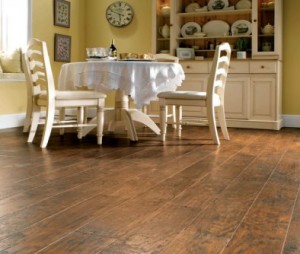Is vinyl a practical flooring solution... or is it soooo last century? Well we’d probably argue a little of both. Vinyl has some clear advantages and disadvantages. If you’re considering vinyl for your home or commercial space, here’s some information to help in your decision.
Vinyl entered the flooring scene in the 1930s, and has experienced peaks and lows in popularity throughout the decades. While vinyl is currently not the most popular flooring option, the product has evolved immensely over the years, and has come a long way in style and durability. Vinyl does offer some key advantages:
-Durabilty. Vinyl is a durable product that is resistant to scratches and moisture, making it ideal for kitchens, bathrooms, and laundry rooms. It is also available with an enhanced urethane finish, for even greater resilience to scratching and helping to keep its new appearance for longer periods of time.
-Affordability. Vinyl is the most affordable flooring option. Period.

-Large selection of colors and designs. Because vinyl is a man-made product, it can be produced in almost any color or pattern, giving homeowners a wide range of options. Vinyl is also available in planks and tiles (as opposed to the traditional sheet vinyl) to replicate the look of hardwood and tile.
-Comfort. Vinyl is more comfortable underfoot than tile, and is not as cold or hard.
-Easy to clean. Vinyl can be mopped using a variety of cleaning products. There is no concern about cleaning grout, as with tile, or having to purchase special products, as with hardwood.
With all these advantages, you may be thinking why wouldn’t we choose vinyl? First, vinyl does not offer the same natural beauty and appeal of other flooring options. In essence, it does have a cheaper appearance. You’re not likely to hear someone viewing a home say, “Ooooh look at those nice vinyl floors!” or “It’s got vinyl throughout! Just what I was looking for!” Also, while vinyl is durable, it cannot be refinished or restored, so it will have to be replaced sooner than hardwood or tile would. Lastly, vinyl typically does not add value to a home or offer a return on investment for most homeowners.
So when does vinyl make sense? There are a few situations for which we believe vinyl is a viable option:
-Easy to clean. Vinyl can be mopped using a variety of cleaning products. There is no concern about cleaning grout, as with tile, or having to purchase special products, as with hardwood.
With all these advantages, you may be thinking why wouldn’t we choose vinyl? First, vinyl does not offer the same natural beauty and appeal of other flooring options. In essence, it does have a cheaper appearance. You’re not likely to hear someone viewing a home say, “Ooooh look at those nice vinyl floors!” or “It’s got vinyl throughout! Just what I was looking for!” Also, while vinyl is durable, it cannot be refinished or restored, so it will have to be replaced sooner than hardwood or tile would. Lastly, vinyl typically does not add value to a home or offer a return on investment for most homeowners.
So when does vinyl make sense? There are a few situations for which we believe vinyl is a viable option:
- Commercial spaces. VCT (vinyl composition tile) is great for schools, offices, stores, and other commercial settings. Vinyl can also be made with a slip resistant surface, to minimize accidents.
- Homes under $125,000, particularly in bathrooms and laundry rooms.
- Rental properties.

No comments:
Post a Comment